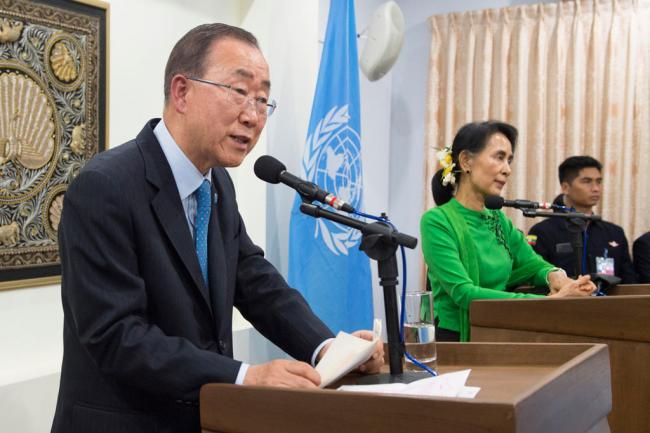
In Myanmar, UN chief spotlights country’s challenging path towards multi-ethnic democracy
“On Tuesday, Daw Aung San Suu Kyi and I agreed that the people of Myanmar, whatever their ethnicity, religion or economic status, want better social and economic opportunities, in an environment where everyone is free, equal and secure,” the UN chief told reporters in a joint press stakeout with Suu Kyi in the capital city, Nay Pyi Taw.
With the coming into effect of the 2008 Constitution and the country’s opening of its doors to democratic reforms, the role of the Secretary-General’s good offices in Myanmar has evolved into one of engagement, encouragement and support for reform, reconciliation and democratization, according to the UN Department of Political Affairs. Furthermore, the landmark elections of November 2015 have transformed the country’s political landscape by bringing Suu Kyi and her party, the National League for Democracy, into power.
“The United Nations has consistently supported Daw Aung San Suu Kyi’s struggle for democracy,” Ban said, noting that the UN’s support took the form of successive resolutions of the General Assembly, the appointment of his own Special Adviser on the country and the Human Rights Council’s appointment of a Special Rapporteur of the country’s human rights, as well as his own visits and engagement with Myanmar authorities.
Ban noted that he had visited Myanmar four times since becoming the UN Secretary-General. In 2008, he visited the country to mobilize international assistance in the wake of the devastation left by Cyclone Nargis. In 2009, he encouraged the military leadership to open its doors to democratic change. In 2012, he addressed the parliament at a time when the dramatic changes sweeping Myanmar were inspiring the world. And, in 2014, he participated in the Association of Southeast Asian Nations (ASEAN) Summit chaired by Myanmar.
“On Tuesday,” Ban said, “I am very pleased and honoured to be back to witness the latest phase in your transition, marked by the peaceful, dignified and enthusiastic participation in the elections last November.”
The UN chief went on to acknowledge the leadership of former President U Thein Sein in helping the country move steadily on this path of reform, and commended the new Government led by President U Htin Kyaw for its emphasis on dialogue, cooperation and reconciliation between military and civil society leaders and political and economic stakeholders.
“However, the Government also faces great challenges,” Ban said, stressing that the steps taken so far towards peace and national reconciliation will need to be further strengthened, broadened and consolidated.
“This is the real expectation of the international community,” he added.
On developments in Rakhine state
Ban said he also discussed with Suu Kyi, who is also the country’s State Counsellor, the latest developments in the northern state of Rakhine, where tens of thousands of Rohingya Muslims have been living in poorly conditioned camps as a result of their communal conflict with a Buddhist sect.
“I conveyed the concern of the international community about the tens of thousands of people who have been living in very poor conditions in IDP [internally displaced persons] camps for over four years,” he said.
“This is not just a question of the Rohingya community’s right to self-identify. The broader issue is that all of Myanmar’s people, of every ethnicity and background, should be able to live in equality and harmony, side by side with their neighbours,” the UN chief continued. “People who have been living for generations in this country should enjoy the same legal status and citizenship as everyone else.”
The steps you have taken towards peace and national reconciliation will need to be further strengthened, broadened and consolidated. This is the real expectation of the international community.
In Singapore earlier on Tuesday, the Secretary-General received an honorary Doctor of Letters from the National University of Singapore, and met with the country’s President Tony Tan Keng Yam, Prime Minister Lee Hsien Loong, and Minister for Foreign Affairs Vivian Balakrishnan.
According to a readout of the meeting issued by his spokesman’s office, the Secretary-General expressed hope that Singapore will ratify the Paris Agreement on climate change before the end of the year, and discussed regional issues, including strengthening the ASEAN-UN partnership, the situation in Myanmar, the issue of the South China Sea, and his efforts on the prevention of violent extremism and on responsibility-sharing in the refugees and migrants crisis.
UN Photo/Eskinder Debebe
Source: www.justearthnews.com
Support Our Journalism
We cannot do without you.. your contribution supports unbiased journalism
IBNS is not driven by any ism- not wokeism, not racism, not skewed secularism, not hyper right-wing or left liberal ideals, nor by any hardline religious beliefs or hyper nationalism. We want to serve you good old objective news, as they are. We do not judge or preach. We let people decide for themselves. We only try to present factual and well-sourced news.







